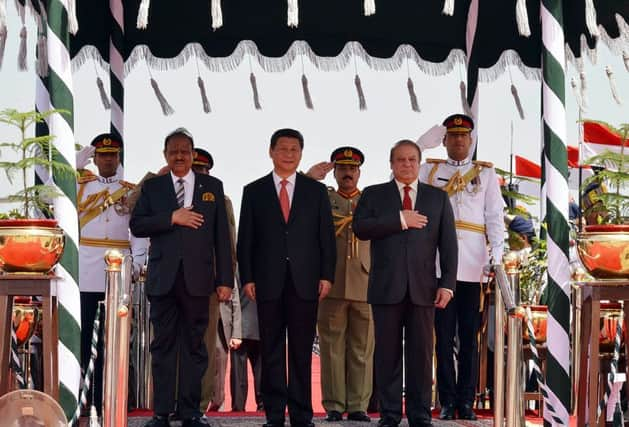Chinese and Pakistan in £30bn investment deal


Prime Minister Nawaz Sharif and the country’s top civilian and military leadership received the visiting president at an air force base near the capital, Islamabad. The president was given a military honour guard and a fighter jet fly-by.
Mr Xi will announce $45bn worth of projects in the energy and infrastructure sectors, Pakistan’s minister for planning and development, Ahsan Iqbal, said, calling it “proof of our great bond with China”.
Advertisement
Hide AdAdvertisement
Hide AdHe said around $37bn of that would be invested in energy. He also clarified that the total amount was $45bn. Pakistani officials had previously put the total at $46bn.
Mr Iqbal said work on $28bn worth of projects can begin immediately, with work on the remainder starting in the next three to five years. He called the agreements a “milestone in our history”.
Mr Sharif said the visit will open a new chapter in bilateral relations. “We will work hand in hand with you to remove any obstacle in your way to ensure timely completion of the planned projects,” he said in a meeting with the heads of three Chinese companies.
China and Pakistan have long maintained close political and military relations, based partly on mutual antipathy toward neighbour India. However, stronger China-India ties have challenged that perception and Xi’s visit seems intended to reassure Pakistan that relations remain robust.
Mr Xi postponed a visit to Islamabad last year due to anti-government protests and went ahead with a visit to India. China is also eager to boost trade and investment with New Delhi, and Indian Prime Minister Narendra Modi is expected to visit Beijing in the coming weeks.
China is a leading arms supplier to Pakistan and has sought its help in combating anti-Chinese Islamic separatists reportedly hiding in the country’s lawless tribal areas. China is also eager to enlist Pakistan’s help in stabilising Afghanistan as US and international troops wind down their presence there.
Mr Xi will be travelling with a large business delegation and is expected to oversee the signing of investment agreements in the energy and transportation industries, part of Beijing’s plan for a China-Pakistan “economic corridor”.
“This is very important for our economic stability and development,” said political science professor Raul Bakhsh Rais.
Advertisement
Hide AdAdvertisement
Hide AdIn advance of his trip, Mr Xi wrote in a column: “We need to form a ‘1+4’ cooperation structure with the Economic Corridor at the centre and the Gwadar Port, energy, infrastructure and industrial cooperation being the four key areas to drive development across Pakistan and deliver tangible benefits to its people.”
Most striking about the visit is the scale of Mr Xi’s aid announcement compared with the American effort from 2009 to 2012 spearheaded in Congress by John Kerry, then a senator, and pressed in Pakistan by Hillary Clinton, then secretary of state.
The programme designated $7.5bn for development projects over five years.
That effort was a “dramatic failure” because the resources were scattered too thinly, and had no practical or strategic impact, said David Sedney, a former senior official at the Pentagon responsible for Pakistan during that period.